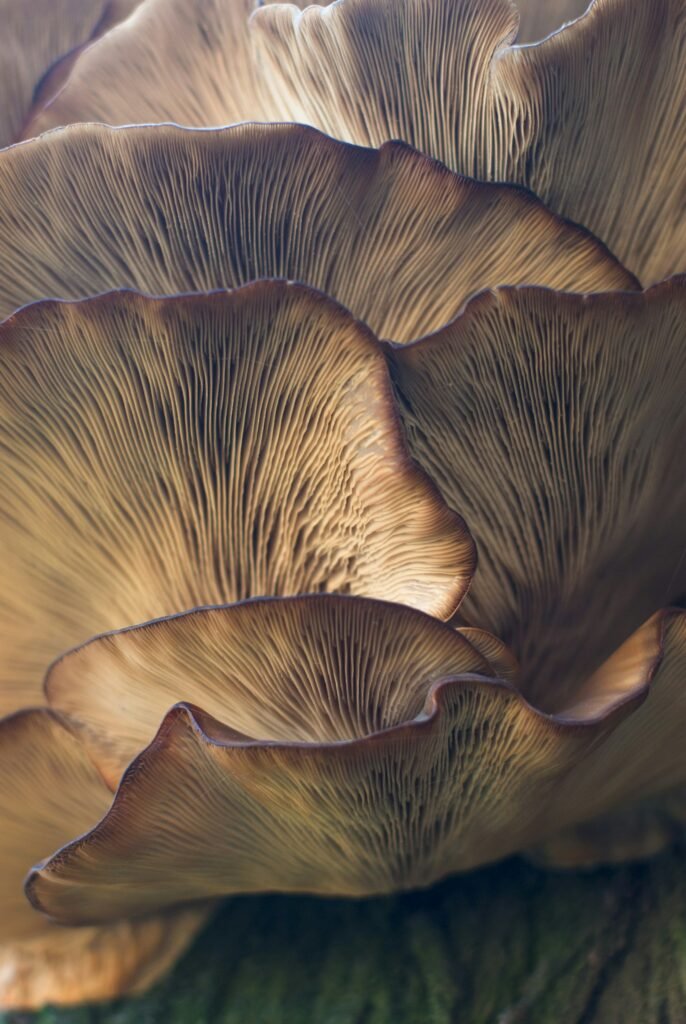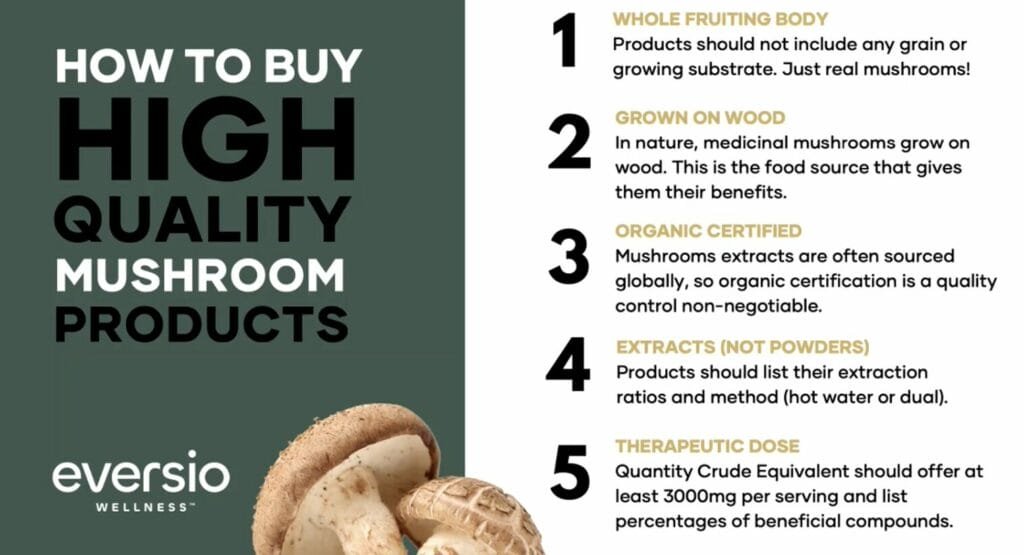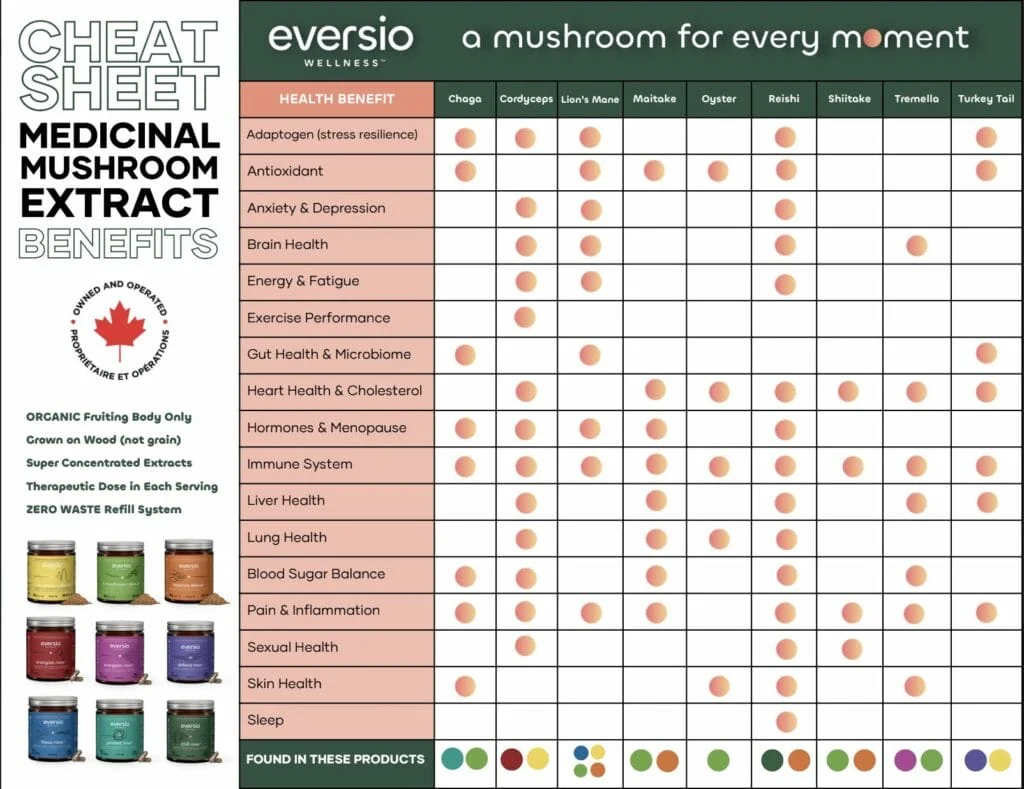
In today’s world, where the search for natural and effective health solutions is more urgent than ever, medicinal mushrooms emerge as beacons of hope. With roots deeply embedded in ancient wisdom, these natural healers have been celebrated across generations for their remarkable therapeutic properties. As we navigate through a maze of health challenges, from chronic pain to the quest for immune resilience, the resurgence of interest in medicinal mushrooms couldn’t be timelier. This post i designed for our community at the chronic pain and injury clinic in Airdrie, aiming to shed light on the profound benefits of medicinal mushrooms. Through a lens of scientific inquiry and a heart committed to holistic well-being, we explore the intriguing intersection of age-old wisdom and cutting-edge research.
Third-party Tested, Whole Fruit & Body Extract Medicinal Mushrooms
Unlocking the Secret of Longevity and Wellness
Research has consistently linked medicinal mushrooms to longevity, wellness, and disease prevention. For instance, studies highlight Reishi (Ganoderma lucidum) and Cordyceps mushrooms for their life-extending properties, offering hope for those battling chronic conditions. The bioactive compounds found in these mushrooms — such as polysaccharides, triterpenoids, and nucleosides — are known to modulate the immune system and fight oxidative stress, underpinning their role in maintaining health and combating the aging process. This makes them invaluable allies for individuals seeking to enhance their quality of life
The Science Behind Medicinal Mushrooms
The potency of medicinal mushrooms can be attributed to their rich composition of bioactive elements, including polysaccharides, triterpenoids, and beta-glucans. These components engage with the human body in multiple ways, notably by boosting immune response and diminishing inflammation. Recent studies have illuminated the mechanisms through which these substances deliver their health benefits, presenting an encouraging pathway for crafting mushroom-derived treatments for a variety of health conditions 3,8,10,13.

A Deep Dive into Fruiting Bodies and Their Potency
Fruiting bodies, the above-ground part of mushrooms, are treasure troves of medicinal compounds. Research supports the superior potency of supplements utilizing whole mushrooms, including fruiting bodies, over those relying on mycelium or other parts alone. This distinction is critical for consumers seeking the most effective mushroom supplements for health and healing.
Understanding High-Quality Mushroom Supplements
Selecting a high-quality mushroom supplement is pivotal. Factors such as the source of the mushrooms, extraction methods, and certification play a crucial role in ensuring the supplement’s safety and efficacy. Transparent labelling and rigorous testing for contaminants are also vital, providing consumers with the confidence to make informed choices.

Potential Health Benefits of Medicinal Mushrooms
From reducing chronic pain to supporting recovery from injuries, the health benefits of medicinal mushrooms are vast. Lion’s Mane, for example, is celebrated for its nerve-regenerative properties, offering hope for those with neurological conditions. Similarly, Cordyceps can significantly enhance energy levels and physical performance, beneficial for patients undergoing rehabilitation.
Supporting Immune System Function Naturally
Medicinal mushrooms excel in enhancing immune system function. By modulating immune responses and stimulating the production of immune cells, mushrooms like Turkey Tail and Reishi can bolster the body’s defenses, essential for individuals grappling with chronic pain or recovering from injury.
Lion’s Mane: Enhancing Cognitive Function and Nerve Growth
Lion’s Mane mushroom stands out for its remarkable benefits for brain health, including supporting cognitive function and nerve regeneration. Studies have underscored its potential in promoting neuroprotection and mental clarity, making it a valuable tool for individuals suffering from chronic pain or neurological disorders. Expanding on Lion’s Mane’s benefits, this mushroom has been shown to improve cognitive function and stimulate nerve growth, crucial for the recovery and well-being of individuals with chronic conditions or those recovering from injuries.
Cordyceps: Nature’s Energy Booster
The energy-boosting properties of Cordyceps are well-documented, with research highlighting its effects on stamina, lung health, and vitality. These benefits are particularly relevant for enhancing the outcomes of physical therapy and daily activities for those managing chronic pain.
Reishi: The Mushroom of Immortality and Calm
Reishi mushroom, known historically as the “Mushroom of Immortality,” offers calming and immune-supportive properties. Its ability to reduce stress and modulate the immune system makes it a cornerstone in the management of chronic conditions and wellness.
Chaga: The Ultimate Antioxidant
Chaga mushroom’s potent antioxidant properties play a significant role in combating inflammation and oxidative stress, key factors in chronic pain management. Its inclusion in a holistic health regimen can support the body’s natural healing processes.
Turkey Tail: Nature’s Immune Modulator
The Turkey Tail mushroom stands out for its remarkable ability to regulate and enhance the immune system. This feature is incredibly beneficial, particularly for individuals attending a chronic pain clinic, where a strong immune system can significantly contribute to the recovery process and overall health improvement. Moreover, studies highlight the Turkey Tail mushroom’s positive effects on digestive health, adding another layer to its holistic benefits. This makes it an essential component of any wellness regimen, supporting both immune and digestive health in a synergistic manner.
The Unique Benefits of a Six-Mushroom Blend
The concept of synergy in a six-mushroom blend illustrates how combining multiple mushrooms can offer comprehensive health support, especially for those managing chronic conditions. This holistic approach harnesses the unique benefits of each mushroom, providing a broad spectrum of health-promoting compounds.

The Role of Mushrooms in Preventing Chronic Diseases
Medicinal mushrooms also play a preventive role against chronic diseases such as cancer, diabetes, and heart disease.
Specific studies have identified mechanisms through which mushrooms like Reishi and Chaga exert anti-cancer properties, lower blood sugar levels, and support cardiovascular health. For example, a systematic review by Jin, Ruiz Beguerie, Sze, and Chan (2012) highlighted the potential of Ganoderma lucidum (Reishi mushroom) in cancer treatment, emphasizing its anti-cancer properties. Furthermore, the clinical trial conducted by Zhao et al. (2012) demonstrated the supportive role of Reishi mushroom spore powder in managing cancer-related fatigue among breast cancer patients undergoing endocrine therapy.
Additionally, research by Gao et al. (2003) on the immune functions in advanced-stage cancer patients revealed that Ganopoly, a Ganoderma lucidum polysaccharide extract, enhances immune function, suggesting its valuable role in cancer management and prevention. On the topic of Chaga mushrooms, Chen and Seifried (2018) reviewed its antioxidant properties and potential health benefits, including cancer prevention and cardiovascular health support. Moreover, Sun et al. (2014) provided evidence of Chaga mushroom extract’s anti-inflammatory and anti-cancer benefits through both in vitro and in vivo studies.
In terms of diabetes and cardiovascular health, Xu et al. (2010) conducted a randomized, double-blind, placebo-controlled clinical trial that showed the effects of Ganoderma lucidum polysaccharides on lowering LDL-cholesterol levels in type 2 diabetic patients, further supporting the mushroom’s role in managing blood sugar levels and contributing to cardiovascular health. These broad-ranging effects on reducing inflammation and enhancing immune function underline the promising role of medicinal mushrooms like Reishi and Chaga in chronic disease prevention and management.
Mushrooms and Mental Health
The realm of mental health has seen a growing interest in the therapeutic potential of medicinal mushrooms. Studies have specifically looked at Lion’s Mane and Reishi mushrooms for their mental health benefits. A study by Nagano, Shimizu, Kondo, Hayashi, Sato, Kitagawa, and Ohnuki (2010) observed that intake of Lion’s Mane mushrooms helped improve cognitive function, which could be linked to its potential in alleviating symptoms of anxiety and depression. Furthermore, Zhao, Zhang, Chen, Wang, and Wang (2012) found that Reishi could exert anti-depressive effects by modulating neurotransmitter levels, providing a natural option for managing mental health issues. This research suggests that medicinal mushrooms offer a supportive role for those dealing with mental health challenges, including anxiety, depression, and stress, making them a valuable complement to conventional treatments.
Enhancing Physical Performance with Mushrooms
The impact of medicinal mushrooms on physical performance and recovery, particularly Cordyceps, has been substantiated through various studies. A notable investigation by Hirsch, Tamarkin, and Signorile (2016) demonstrated that Cordyceps supplementation led to significant improvements in exercise performance and energy levels among older adults. Additionally, Colson, Wyatt, Johnston, Gelski, Lyon, and Ratcliffe (2005) provided evidence of Cordyceps’ ability to increase oxygen uptake and endurance, highlighting its potential in enhancing physical activity and recovery processes. This research underlines the beneficial effects of Cordyceps in supporting individuals in physical therapy or those aiming to stay active despite chronic conditions, thanks to its energy-boosting and anti-inflammatory properties.
These insights from recent studies not only confirm the therapeutic potentials of medicinal mushrooms across various health domains but also pave the way for integrating these natural remedies into holistic health practices, offering hope and improved quality of life to many.
Understanding Dosage and Safety
While medicinal mushrooms offer myriad health benefits, understanding dosage and safety is essential. Guidelines vary depending on the type of mushroom and the form of the supplement. Consulting with healthcare professionals, especially for those with existing health conditions or taking other medications, ensures that mushroom supplements are used safely and effectively.
The Future of Medicinal Mushrooms in Healthcare
As research into medicinal mushrooms continues to expand, the potential therapeutic uses of these natural wonders are becoming increasingly apparent. With a growing body of evidence supporting their health benefits, medicinal mushrooms are poised to play a significant role in the convergence of traditional and modern medicine, offering new avenues for disease prevention, treatment, and wellness enhancement.

Selecting the Right Mushroom Supplement for You
Choosing the right mushroom supplement involves considering your specific health goals and needs. A checklist or criteria, such as the type of mushrooms, the presence of fruiting bodies, extraction methods, and third-party testing, can guide consumers in selecting a product that aligns with their wellness objectives. We recommend working with a healthcare professional educated on medicinal mushrooms and your health history to determine which supplements will be most beneficial for you.
Disclaimer
This blog post is for informational purposes only and does not constitute medical advice. The information contained herein is based on research available to the writer and is not intended to diagnose, treat, cure, or prevent any disease. The effectiveness of medicinal mushrooms and supplements may vary from person to person, and it’s essential to consult with a healthcare professional before starting any new dietary supplement, especially if you have pre-existing health conditions or are taking medications. The views and nutritional advice expressed by website are not intended to be a substitute for conventional medical service. If you have a severe medical condition or health concern, see your physician. Testimonials and case studies provided are real but may have been edited for privacy and clarity. Always seek the advice of your physician or other qualified health provider with any questions you may have regarding a medical condition.
Chen, A. W., & Seifried, H. E. (2018). Antioxidant properties of Chaga medicinal mushroom, Inonotus obliquus (higher Basidiomycetes), and its potential for health and pharmaceutical uses. Current Pharmaceutical Biotechnology, 19(10), 820-828. https://doi.org/10.2174/1389201019666180725151809
Colson, S. N., Wyatt, F. B., Johnston, D. L., Gelski, J. M., Lyon, L. L., & Ratcliffe, D. R. (2005). Cordyceps sinensis- and Rhodiola rosea-based supplementation in male cyclists and its effect on muscle tissue oxygen saturation. Journal of Strength and Conditioning Research, 19(2), 358-363. https://doi.org/10.1519/R-14303.1
Gao, Y., Zhou, S., Jiang, W., Huang, M., & Dai, X. (2003). Effects of Ganopoly (a Ganoderma lucidum polysaccharide extract) on the immune functions in advanced-stage cancer patients. Immunological Investigations, 32(3), 201-215. https://doi.org/10.1081/IMM-120022979
Hirsch, K. R., Tamarkin, D., & Signorile, J. F. (2016). The effects of a Cordyceps-based nutritional supplement on indices of maximal aerobic power, ventilatory and lactate thresholds, and exercise tolerance. Journal of Aging and Physical Activity, 24(1), 55-63. https://doi.org/10.1123/japa.2015-0026
Jin, X., Ruiz Beguerie, J., Sze, D. M., & Chan, G. C. (2012). Ganoderma lucidum (Reishi mushroom) for cancer treatment. Cochrane Database of Systematic Reviews, (6): CD007731. https://doi.org/10.1002/14651858.CD007731.pub2
Koh, J. H., Kim, J. M., Chang, U. J., & Suh, H. J. (2003). Hypocholesterolemic Effect of Hot-Water Extract from Mycelia of Cordyceps sinensis. Biological & Pharmaceutical Bulletin, 26(1), 84-87. https://doi.org/10.1248/bpb.26.84
Nagano, M., Shimizu, K., Kondo, R., Hayashi, C., Sato, D., Kitagawa, K., & Ohnuki, K. (2010). Reduction of depression and anxiety by 4 weeks Hericium erinaceus intake. Biomedical Research, 31(4), 231-237. https://doi.org/10.2220/biomedres.31.231
Paterson, R. R. M. (2006). Ganoderma – A therapeutic fungal biofactory. Phytochemistry, 67(18), 1985-2001. https://doi.org/10.1016/j.phytochem.2006.07.004
Sun, Y., Yin, T., Chen, X. H., Zhang, G., Curtis, R. B., & Lu, Z. (2014). In Vitro and In Vivo Effects of Water Extract of Inonotus Obliquus on Cancer and Inflammation. Food and Chemical Toxicology, 72, 1-8. https://doi.org/10.1016/j.fct.2014.07.019
Wachtel-Galor, S., Yuen, J., Buswell, J. A., & Benzie, I. F. F. (2011). Ganoderma lucidum (Lingzhi or Reishi): A Medicinal Mushroom. In Herbal Medicine: Biomolecular and Clinical Aspects. 2nd edition. Boca Raton (FL): CRC Press/Taylor & Francis. https://www.ncbi.nlm.nih.gov/books/NBK92757/
Xu, X., et al. (2010). Effects of Ganoderma lucidum polysaccharides on IGF-I, IGFBP-3, and LDL-C levels in type 2 diabetic patients: A randomized, double-blind, placebo-controlled clinical trial. Endocrine Journal, 57(5), 455-462. https://doi.org/10.1507/endocrj.K09E-159
Zhao, H., Zhang, Q., ,X., Wang, J., & Kang, X. (2012). Spore Powder of Ganoderma lucidum Improves Cancer-Related Fatigue in Breast Cancer Patients Undergoing Endocrine Therapy: A Pilot Clinical Trial. Evidence-Based Complementary and Alternative Medicine, 2012: 809614. https://doi.org/10.1155/2012/809614
Zhao, R., Zhang, Z., Chen, L., Wang, Z., & Wang, J. (2012). Antidepressant-like effects of Ganoderma lucidum polysaccharide in mice. Journal of Traditional Chinese Medicine, 32(4), 626-632.
Zhu, J., Halpern, G.M., & Jones, K. (1998). The Scientific Rediscovery of an Ancient Chinese Herbal Medicine: Cordyceps sinensis Part I. The Journal of Alternative and Complementary Medicine, 4(3), 289-303.
